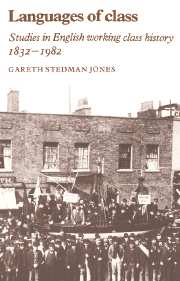Book contents
- Frontmatter
- Contents
- Acknowledgements
- Introduction
- 1 Class struggle and the Industrial Revolution
- 2 Class expression versus social control? A critique of recent trends in the social history of ‘leisure’
- 3 Rethinking Chartism
- 4 Working-class culture and working-class politics in London, 1870–1900: Notes on the remaking of a working class
- 5 Why is the Labour Party in a mess?
- Index
2 - Class expression versus social control? A critique of recent trends in the social history of ‘leisure’
Published online by Cambridge University Press: 08 January 2010
- Frontmatter
- Contents
- Acknowledgements
- Introduction
- 1 Class struggle and the Industrial Revolution
- 2 Class expression versus social control? A critique of recent trends in the social history of ‘leisure’
- 3 Rethinking Chartism
- 4 Working-class culture and working-class politics in London, 1870–1900: Notes on the remaking of a working class
- 5 Why is the Labour Party in a mess?
- Index
Summary
For social historians, systematic interest in popular recreation and debate over the use of leisure is relatively recent. Pioneering research on the subject scarcely goes back beyond the end of the 1950s; and, undoubtedly, the growing attention which historians have paid to it has owed a lot to the increasing recourse to sociology and anthropology in the definition of problems worthy of historical research. The amount of work going on in this area is now on a sufficient scale to make it possible to step back and make at least some interim judgements on the ways in which the problem seems to have been conceived and to examine how far the conceptual instruments employed have been adequate either to posing the right questions or to resolving them.
But, before examining the concepts employed, it is first necessary to stress that knowledge of this area still remains very uneven. Certain well defined themes have emerged and this has encouraged research along a few oft trodden routes, while leaving large parts of the landscape almost unmapped. Research has tended to concentrate upon the advance of a methodical capitalist rationality and the disappearance or decline of traditional forms of popular recreation in its wake. Problems which cannot be so comfortably contained within the terms of this juxtaposition have tended to be neglected. There is no substantial study, for example, of how far changes in the sexual division of labour before, during and after industrialization produced changing sexually segregated patterns of leisure, or indeed of the pattern of segregation itself.
- Type
- Chapter
- Information
- Languages of ClassStudies in English Working Class History 1832–1982, pp. 76 - 89Publisher: Cambridge University PressPrint publication year: 1984
- 2
- Cited by



